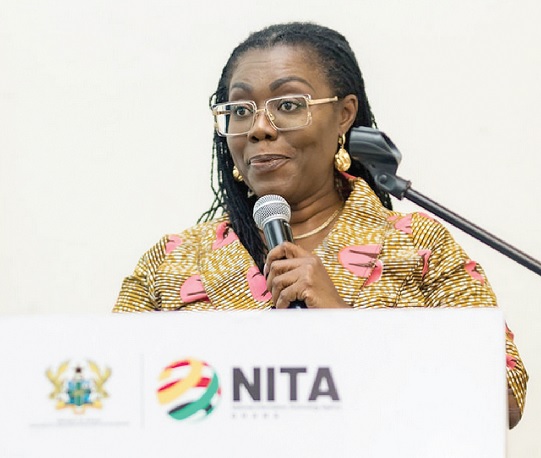
Digital economy requires standards, rules of engagement — Ursula
The Minister of Communications and Digitalisation, Ursula Owusu-Ekuful, has stated that developing the country's digital economy requires standardised rules of engagement and competition.
Therefore, she said the proposed Legislative Instrument for the National Information Technology Agency (NITA) Act, Act 771 and the Electronic Transactions Act, Act 772 is key to strengthening the country’s Information and Communication Technology (ICT) ecosystem.
That, she said, would also equip NITA to perform its proper role as the Regulator for all ICT-related matters and electronic transactions in Ghana.
“We cannot develop our digital economy and digital transformation in a vacuum and our participation in the 4th Industrial Revolution requires a fit-for-purpose ICT ecosystem, operating within a standardised framework with properly laid out rules of engagement and competition,” she said.
Mrs Owusu-Ekuful was speaking at a stakeholder engagement on the draft Legislative Instrument for the NITA Act, Act 771 and the Electronic Transactions Act, Act 772 in Accra yesterday.
She explained that Act 771 defined the objective for the establishment of NITA as an agency to regulate the provision of information communication technology, ensure the provision of quality information communication technology, promote standards of efficiency and ensure high-quality service.
NITA to issue licences
She said NITA was, therefore, expected to issue licences to service providers and ensure fair competition, among others, a roadmap which was set out as far back as 2008.
“Unfortunately, without properly understanding their mandate, NITA never performed the role prescribed by its enabling Act fully but rather got engrossed in operations and became a service provider, competing in the same space as the entities it was mandated to regulate,” she said.
According to her, the ministry dumped projects it could not operate on and watched it flounder.
She added that without regulation, the nation embarked on digital initiatives with no direction and was held captive by service providers who did as they pleased with no regard for the sustainability of initiatives, and interoperability of systems as ICT procurement for ministries, departments and agencies (MDAs) were done with no oversight and no set standards guiding it.
The situation, she said, led to the wanton dissipation of public resources as it encouraged duplication, waste and procurement of sometimes near-end-of-life systems which were unfit for purpose.
Potential of ICT
Mrs Owusu-Ekuful explained that the significance of technology could not be overemphasised in this increasingly interconnected world; hence, the government recognised the transformational power and potential of ICT.
She said the government had set ambitious goals of becoming an inclusive, progressive digital hub in Africa by ensuring that no citizen was left behind.
She said the draft Legislative Instruments (LIs) would lay the foundation for a robust regulatory framework that nurtured innovation, safeguarded the rights and interests of all stakeholders, and addressed crucial domains such as digital infrastructure, applications, systems, innovation and e-commerce.
“It is pertinent to acknowledge that legislation alone cannot bring about the desired transformation.
It is only through our collective efforts and close collaboration with all stakeholders that we can establish the right legal and regulatory framework to achieve the desired transformation.
“The successful implementation and widespread adoption of these legislative instruments can only facilitate this process,” the minister added.
The Director-General of the National Information Technology Agency (NITA), Richard Okyere-Fosu, said: “The proposed legislative instruments have been crafted with the aim of further strengthening and enhancing the implementation of the respective Acts and in turn, fortifying our nation's IT infrastructure for the challenges of tomorrow.”
He said collaborative strategies for the smooth utilisation of the Lis, passed by Parliament, were needed to shape the future of our nation's information technology landscape.
“Together, we could make a tangible impact on the digital landscape, shaping policies that foster innovation, inclusivity and sustainability.
Our collective aim should be the fulfilment of an age-long responsibility which we neglected and the need to shape the ICT ecosystem for posterity,” he said.